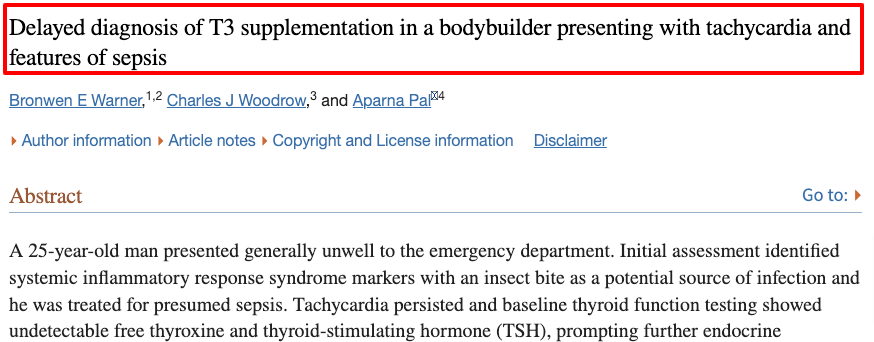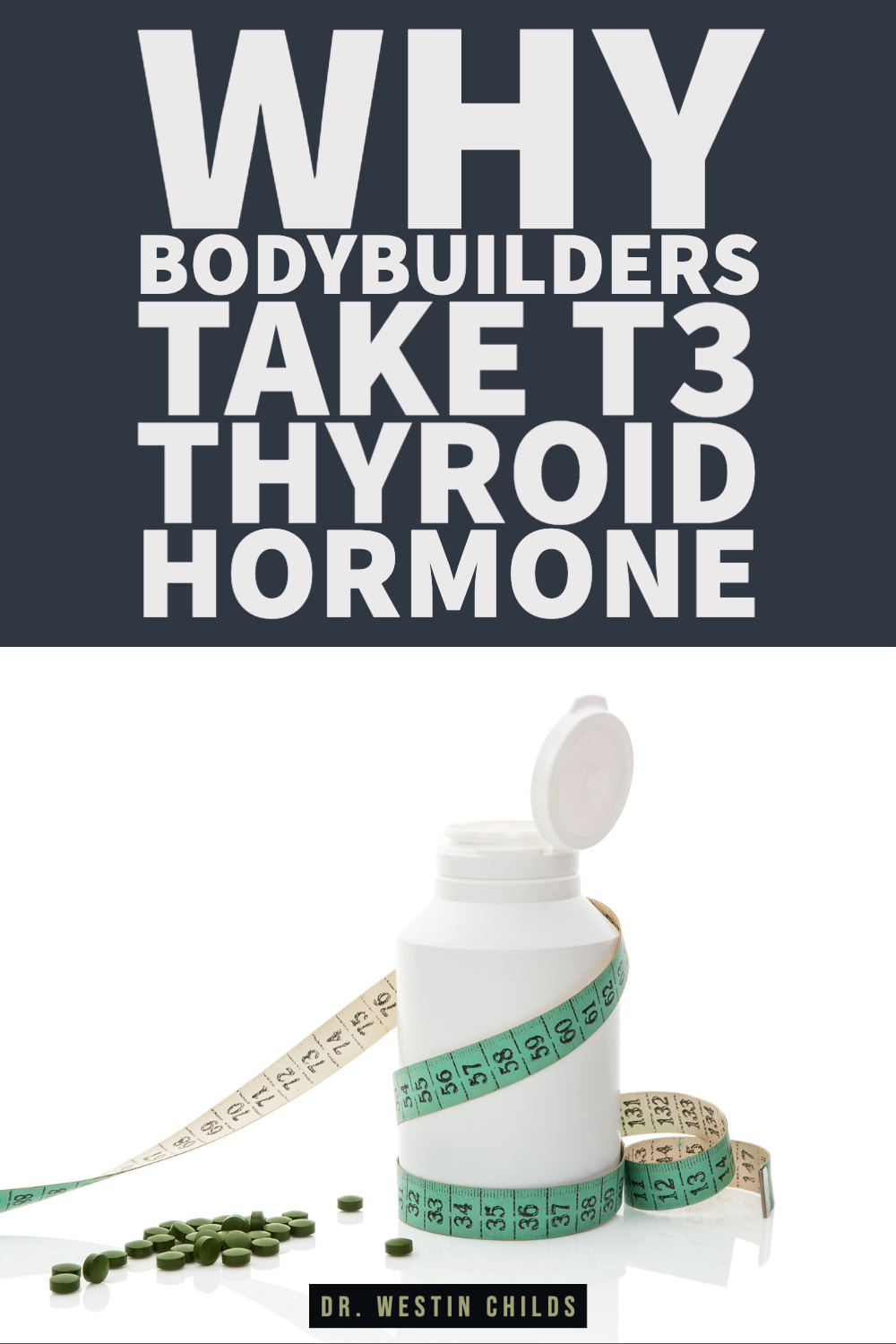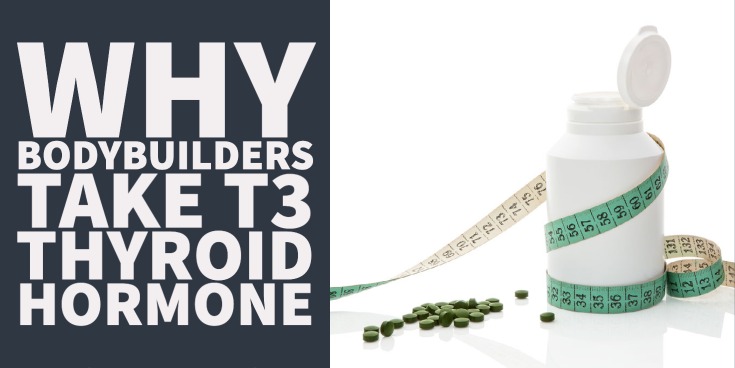Believe it or not, there’s a fair amount of information we can learn from bodybuilders, especially when it comes to hormone management.
I’m not suggesting or even recommending that you follow their advice, but there’s no question that this community serves as a reservoir of knowledge because they are essentially using themselves as human guinea pigs (1).

This leads us to the topic of the use of T3 thyroid hormone by the body-building community.
Have you ever wondered why some people are able to lose weight rapidly while maintaining a muscular physique?
Or how movie stars are able to slim down or bulk up within a matter of weeks to months to get ready for their role?
Contrary to popular belief, they do not possess insider secrets or special knowledge that isn’t available to the likes of you and me.
No, the answer is all in the hormones.
The unrestricted use of testosterone, growth hormone, insulin, and thyroid hormone certainly plays a role in many (but not all) of the physiques that you see on television and social media.
But is this standard healthy?
Should hormones be used to augment physiques and assist with weight loss?
And what sort of takeaways can you learn from their use?
That’s exactly what we are going to be discussing today.
If you want to learn more about the use of T3 and how it has the potential to help with weight loss then keep on reading.
DOWNLOAD FREE RESOURCES
Foods to Avoid if you Have Thyroid Problems:
I’ve found that these 10 foods cause the most problems for thyroid patients. Learn which foods you should avoid if you have thyroid disease of any type.
The Complete List of Thyroid Lab tests:
The list includes optimal ranges, normal ranges, and the complete list of tests you need to diagnose and manage thyroid disease correctly!
T3 Thyroid Hormone & Weight Loss
The relationship between thyroid hormones and weight is a lot more complicated than it might seem (2).
It’s well known that low thyroid function leads to weight gain but it’s also widely appreciated that replacing lost thyroid hormone typically doesn’t lead to weight loss.
At first glance, this appears counterintuitive.
How can it be that the treatment for something that results in weight gain not result in weight loss, if the problem is corrected?
There are lots of potential explanations for why this occurs including the fact that many thyroid patients remain underdosed despite taking prescription thyroid medications and that weight gain in hypothyroid states is primarily fluid related (3) but let’s leave those aside for now.
The topic I want to focus on here is the choice of thyroid hormone replacement that doctors use for hypothyroid patients.
Almost without exception, thyroid patients are treated with thyroid medication that contains only T4 thyroid hormone (not T3, which is the topic of our discussion today).
T4 thyroid hormone, while still a biologically active hormone, is nowhere near as active as T3.
It’s hard to know exactly how much more powerful T3 is compared to T4 but it’s estimated to be anywhere from 4x more powerful to 200x more powerful (4) depending on which metric you look at.

The difference in biological activity almost certainly plays a role in why thyroid patients don’t lose weight when taking prescription thyroid medication.
Why? Because they are using a very inactive and weak form of thyroid hormone.
You would be hard-pressed to find articles or information about the use of levothyroxine and weight loss in the bodybuilding community for one big reason:
It won’t work.
But the use of T3 thyroid hormone by itself, that’s another story.
Because it represents the most powerful thyroid hormone, and because many bodybuilders are willing to put their health on the line to gain even a small advantage, the use of T3 is fairly common.
How is it used? Primarily as a temporary solution to assist with weight loss when cutting fat mass.
When taken in high doses, T3 thyroid hormone will increase metabolism, increase heat production, increase heart rate (5), and rev up the entire body.
The result? More calories burned at baseline which means more weight loss for less effort.
This may sound like a good deal and it may even be appealing to thyroid patients reading this, but it’s not without potential consequences.
T3, Muscle Loss, Bone Loss, and Heart Enlargement
One big potential problem with the use of T3 is that it’s considered to be catabolic.
Catabolism is a term used to describe the breakdown of a tissue in the body (6) and that’s exactly what the use of T3 has the potential to do.

We will talk about the difference between healthy use and abuse in a second but what you need to understand here is that abusing T3 thyroid hormone may result in the breakdown of certain tissues including the bone and muscles.
Muscle catabolism is obviously something that you can’t tolerate as a bodybuilder (the entire goal of bodybuilding is to build muscle, not lose it!) so this particular side effect must be monitored closely.
In addition to its effects on muscles, T3 also has the potential to break down bone tissue (7).
This problem with the breakdown of bone tissue is well-known in the thyroid community and is the very reason why your doctor will recommend against using T3 if you already have osteoporosis or low bone density in general.
T3 use also has the potential to cause heart enlargement (8) which may increase your risk of atrial fibrillation but this is not due to its catabolic nature.
Instead, heart conditions tend to be related to the increased demand put on the heart by the use of T3.
Fortunately, these negative side effects only occur in certain situations including:
- The abuse of T3 thyroid hormone – In other words, using T3 thyroid hormone if you don’t need it or at doses higher than what the body would produce naturally.
- Using T3 thyroid hormone for extended periods of time – These side effects typically won’t be seen unless you’ve misused or abused T3 for many months or years.
- Using T3 thyroid hormone with underlying or existing medical conditions – You’re much more likely to develop bone problems, for instance, if you already had weak bone density prior to taking T3.
While these side effects can occur in both bodybuilders (those with normal thyroid function) and thyroid patients (those with low thyroid function) alike, there is definitely a way to use T3 correctly (in those who need it) in such a way that mitigates or reduces the risk that you will experience any of these side effects.
Let’s talk about that now:
Takeaways for Thyroid Patients
The big takeaway for thyroid patients here is that there is a huge difference between the necessity of a hormone or a medication and the abuse of that hormone.
In the case of T3 for thyroid patients, there is a medical necessity.
In the case of a bodybuilder using T3 thyroid hormone, this could be considered abuse or misuse.
The reason?
One person needs it to function because they can no longer produce it naturally and the other is using it to take advantage of supraphysiological side effects.
I’m not casting judgment on anyone who uses T3 for their own personal gain, that decision is up to them, but we need to be careful not to conflate these two situations and lump them together.
For instance, it’s not fair to suggest that T3 will cause the same side effects in thyroid patients as it will in bodybuilders because, even though the dosing may be the same, the total level of thyroid hormone in the body is much less for those with thyroid dysfunction.

I’ve long been a proponent of T3 thyroid hormone use in thyroid patients because most thyroid patients aren’t able to create enough of it through the thyroid conversion process.
If you are taking a T4-only thyroid medication like levothyroxine then your primary source of T3 production comes from thyroid conversion.
In the healthy state, the body naturally produces about 20% of T3 from the thyroid gland directly (9) and the other 80% comes from peripheral tissues.
If you replace all of that lost thyroid hormone with only T4, you’re setting yourself up for low T3 and low T3-related symptoms (which is the situation that many thyroid patients find themselves in).
In summary, the use of T3 thyroid hormone is a great option for a thyroid medication that can either be used by itself or in conjunction with T4 and T2.
Whether or not it will cause side effects is not based on the medication itself but on the dose being used and the situation of the person using it.
If you are someone who has normal thyroid function and you are taking a high dose to assist with weight loss then you better believe your risk of side effects will be high.
If you are someone with low thyroid function and you are taking a physiologic dose to help bring your thyroid back into normal function then your risk of side effects is very small to nonexistent.
Body Build Dosing vs Healthy Dosing for Thyroid Patients
In the bodybuilding community, the recommended dose of T3 is somewhere between 25mcg to 50mcg taken each day while cutting or losing weight.
And, believe it or not, that’s not far off from the recommended dose that thyroid patients tend to benefit from based on my own experience.
The difference between a bodybuilder using T3 and a thyroid patient using T3 is much different, though, for a couple of reasons:
The first is that thyroid patients already have depressed thyroid function.
In other words, they aren’t producing enough T3, to begin with.
So even if they take the same dose as a bodybuilder, they won’t experience the same set of symptoms or side effects because they have less native thyroid function compared to the bodybuilder.
Think of it like this:
Imagine the healthy thyroid gland produces 80 mcg of T4 and 20 mcg of T3 each day.
A typical thyroid patient may only be able to produce 60% of this value given that they have thyroid dysfunction.
In this case, they would produce 48 mcg of T4 and 12 mcg of T3.
The bodybuilder, on the other hand, would be capable of producing the regular amount.
If you were to then add on the 25 to 50mcg of T3 on top of existing thyroid function, the bodybuilder would be at a much higher total level compared to the hypothyroid patient.
So even though they are taking the same dose, the total thyroid hormone in circulation would be less in the case of the hypothyroid patient which means fewer side effects overall.
And second reason, the use of T3 in the case of the hypothyroid patient may be medically necessary to improve quality of life.
Let’s put it this way:
Would you be willing to take a medication that meant that you could more easily reach your target weight, have the energy to live your life, and reduce symptoms like hair loss or fatigue if it meant accepting a small risk of potential side effects at a later date?
I’m not saying that T3 always causes negative side effects for thyroid patients, in fact, it’s usually the case that it doesn’t.
But even if it did, would it be worth it to you?
Because this is the question that you really need to ask yourself.
Are you willing to take a small potential risk in return for a better quality of life?
The answer depends on you and your values.
In the case of the bodybuilder, they are doing it because they value the results more than they value the potential risks, but the decision for a thyroid patient is a little bit different and should be treated that way.
My Recommendation? Only Use T3 If You Need it (Don’t Abuse it)
Should you use T3 as a thyroid patient? Only if you need it.
And whether or not you need it can be assessed by looking at a combination of your thyroid lab tests, the assessment of your conversion ability, and your symptoms.
My experience suggests that lower doses of T3 in the range of 5 mcg to 25 mcg per day are not only well tolerated by thyroid patients but also very beneficial to symptomatic control.
I would strongly recommend that you not misuse or abuse T3 because of the potential side effects its use may impart.
If you are planning on using it in this way then make sure you aren’t using it for an extended period of time (no more than 6-8 weeks) to reduce the chance of negative consequences on bone, heart, and muscular tissues.
Remember:
There’s no such thing as a free lunch in economics and there’s no such thing as the use of hormones in the body without some side effect.
Hormones, especially thyroid hormones, are among the most powerful compounds in nature (10) and their use should be limited to those who need them.
Now I want to hear from you:
Were you aware that T3 is commonly used to assist with weight loss in the body-building community?
Are you personally taking T3 thyroid hormone right now?
Are you planning on taking T3 to better manage your thyroid?
Leave your questions or comments below!
Scientific References
#1. ncbi.nlm.nih.gov/pmc/articles/PMC7035845/
#2. ncbi.nlm.nih.gov/pmc/articles/PMC6711558/
#3. eje.bioscientifica.com/view/journals/eje/176/1/R15.xml
#4. ncbi.nlm.nih.gov/books/NBK285568/
#5. pubmed.ncbi.nlm.nih.gov/24692351/
#6. ncbi.nlm.nih.gov/pmc/articles/PMC7545035/
#7. ncbi.nlm.nih.gov/pmc/articles/PMC7230461/
#8. ncbi.nlm.nih.gov/pmc/articles/PMC5512680/
#9. ncbi.nlm.nih.gov/books/NBK499850/
#10. ncbi.nlm.nih.gov/books/NBK538498/



Leave a Reply to Greg Thomas Cancel reply